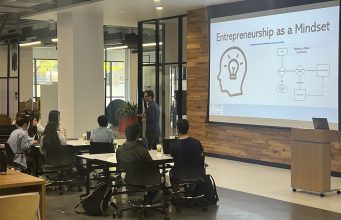
With a focus on impacting lives across the globe with responsible and sustainable business practices, Social Enterprise @ Goizueta recently completed a plan to help its client and partner, ECHO Foundation, establish an eye clinic in Honduras dedicated to developing and diffusing best medical practices across the region.
“Sometimes you see a problem, you get depressed and walk away,” said Peter Roberts Associate Professor of Organization & Management and head of the social enterprise initiative, “Sometimes, if you bring the right people to the table, you see problems that turn into opportunities… If you do something well enough… you can basically reverse what is currently a vicious cycle and turn it into a virtuous cycle.”
The project — Unidos Vision — aims to attract patients from across the economic spectrum and charge flexible rates. According to Roberts, in addition to its immediate medical impacts, the model can generate a financial surplus that can sustain and generate growth in the ophthalmological sector in Honduras.
“We’re expecting to launch a non-profit organization and there will be discussions over the next three or four months,” he said. “The expectation is that we’ll have a for-profit hospital that will be run by a non-profit organization.”
Various members of the Unidos Vision team summarized their research findings and recently presented a set of recommendations they believe will lead to not only a world-class surgical facility in San Pedro Sula, Honduras, but to a “vision cycle” that ultimately creates a self-sustaining “virtual cycle” in various facilities across Honduras and, then, Latin America. If Unidos Vision is able to encourage paying patients to stay in Honduras and get their eye surgery, they’ll attract more resources and more eye surgeons to the area and gain the momentum necessary to service paying, working poor and indigent Hondurans.
The plan is based on a January 2012 start with the clinic opening in May 2013. By year five, the surgical facility should be able to perform roughly 6,000 surgeries per year. According to projections, by year three, Unidos Vision could be generating roughly $1 million per year in profit.
“… That’s the most important thing… It works by itself,” said Ben Mullinex, an MBA candidate on the team presenting revenue and cost projections. “What we tried to do was put together a financial model that takes into account all the assumptions we’re making.”
Mullinex said funds will also be set aside for Honduran doctors to attend additional training sessions abroad, adding to the creation of a more virtuous cycle that creates benefit for doctors and patients for years to come.
Initial findings from the team of MBA, BBA and MPH students, reveal Honduras has the lowest rate of cataract surgeries in Latin America. Moreover, the country struggles in training and keeping qualified surgeons. As such, many paying patients travel abroad for surgery, creating a vicious cycle where there are little to no funds reinvested in the sector.
Ophthalmologists have seen the issue first hand.
Alan Kozarsky, an eye surgeon who has for 20 years donated his time, skill and resources to helping ophthalmology patients in Honduras, says he’s seen failures over the years “because of a lack of an organized approach.” Looking for a solution, he and his colleagues brought the project to Roberts.
“It occurred to us, if we had a sustainable and capable facility running at the highest standards, we could get the mission done,” he said.
The students that were recruited to the project examined various models for serving patients across demographics, including those that focus on the highest volume and quality. The team also made two trips to Honduras to better understand the needs and to assess market conditions. Bob Guinn, a retired architect with experience in health facility construction, joined the team to scout possible locations and advise on construction details.
| Student Team |
|---|
| Jason Bialick (12BBA) |
| Abigail Boorstin (12MPH) |
| Andres Chavarria (12BBA) |
| Blake Kavanaugh (12BBA) |
| Ben Mullinex (12MBA) |
| Susan Sunay (13EvMBA) |
| Braden Willis (12MBA) |
| Peden Young (12MBA) |
“We can estimate a need for about 11,000 cataract surgeries in a year in this region,” said Abigail Boorstin, a Rollins School of Public Health student working with the team. “Currently there are only about 4,000 cataract surgeries per year performed in Honduras and facilities in northern Honduras are only doing several hundred surgeries per year… There’s a large demand for this and it’s not being met.”
One of the effort’s biggest obstacles will be cultural.
Wealthy Hondurans are not currently comfortable interacting with those in other demographics. Currently, the plan is to operate on paying patients on certain days of the week and provide indigent and working poor care on other days at much lower rates. All the work will be done in the same building at a well-regarded — and ultimately well-known — world-class facility.
Other challenges relate to changing perceptions and creating a willingness to change.
“Human egos and emotional factors are the biggest risk,” said Kozarsky. “Financially, it works.”
However, “If you simultaneously think about the challenges and the opportunities of developing this single facility that meets multiple demographic needs… then you have something that’s worth paying attention to,” Roberts said.
The team is currently examining ways to fund the project.
– J. Michael Moore and Allison Shirreffs










